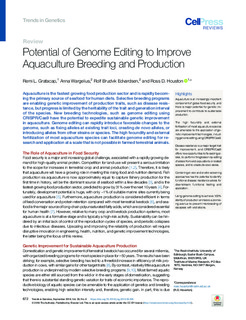| dc.contributor.author | Gratacap, Remi L. | |
| dc.contributor.author | Wargelius, Anna | |
| dc.contributor.author | Edvardsen, Rolf | |
| dc.contributor.author | Houston, Ross D. | |
| dc.date.accessioned | 2019-08-29T11:32:34Z | |
| dc.date.available | 2019-08-29T11:32:34Z | |
| dc.date.created | 2019-08-24T15:14:19Z | |
| dc.date.issued | 2019 | |
| dc.identifier.citation | Trends in Genetics. 2019, 35 (9), 672-684. | nb_NO |
| dc.identifier.issn | 0168-9525 | |
| dc.identifier.uri | http://hdl.handle.net/11250/2611614 | |
| dc.description.abstract | Aquaculture is an increasingly important component of global food security, and there is major potential for genetic improvement to contribute to sustainable production.
The high fecundity and external fertilisation of most aquaculture species are amenable to the application of genetic improvement technologies, including genome editing using CRISPR/Cas9.
Disease resistance is a major target trait for improvement, and CRISPR/Cas9 offers new opportunities to fix existing alleles, to perform introgression-by-editing of alleles from wild populations or related species, and to create de novo alleles.
Combining in vivo and in vitro screening approaches has the potential to identify functional disease resistance alleles for downstream functional testing and application.
Using genome editing to achieve 100% sterility of production animals is a promising avenue to prevent interbreeding of escapees with wild stocks. | nb_NO |
| dc.language.iso | eng | nb_NO |
| dc.title | Potential of genome editing to improve aquaculture breeding and production | nb_NO |
| dc.type | Journal article | nb_NO |
| dc.type | Peer reviewed | nb_NO |
| dc.description.version | publishedVersion | nb_NO |
| dc.source.pagenumber | 672-684 | nb_NO |
| dc.source.volume | 35 | nb_NO |
| dc.source.journal | Trends in Genetics | nb_NO |
| dc.source.issue | 9 | nb_NO |
| dc.identifier.doi | 10.1016/j.tig.2019.06.006 | |
| dc.identifier.cristin | 1718454 | |
| cristin.unitcode | 7431,24,0,0 | |
| cristin.unitname | Reproduksjon og utvikl.biologi | |
| cristin.ispublished | true | |
| cristin.fulltext | original | |
| cristin.qualitycode | 1 | |
